Much like the loving Alvarez family they created, the writers of One Day at a Time work closely together, don’t always agree but love each other anyway. Their collective family experiences helped inform the creation of the characters we fell in love with ever since the show premiered back in 2017, and shaped the series into one of the best things to binge watch on Netflix. Their influences are everywhere. According to one writer, Debby Wolfe, the kids of the show – Elena and Alex – are based on showrunners Mike Royce’s daughter and Gloria Calderón Kellett’s son.
Below, we got a glimpse at some of the family behind the Alvarez family, as told by season two show writers Michelle Badillo, Debby Wolfe, Dan Hernandez and showrunner, Gloria Calderón Kellett.
Season 4 of One Day at a Time premieres March 24, 2020 in its new home at Pop TV.
How did you join the writers room?
Gloria Calderon Kellett: I sat down with Norman Lear early on, and he’s such a wonderful curious man. He asked me to talk about my family and my own experience. My parents came here during Operation Pedro Pan in 1962. They thought they were going to be here for six months, and obviously, we’re still here. They made a life of it not speaking any English. I told him that story, and he asked if I was divorced – I’m not, I’m married – what would that look like for you? And I said my mom would stay with me. He asked what my mom was like, and I told him to picture Rita Moreno. My mom is very tiny, flaquita, always con maquillaje, always has earrings on even when she’s not leaving the house. She’s a badass. My dad is alive, and he’s a little annoyed that he’s dead on the show. They make my life possible. They come over to our house every day, they pick up the kids from school and they make dinner everyday. They’re an enormous part of my life. He liked this idea of the mom character, and he never had an opportunity to work with Rita. Thank goodness Norman reached out to her to do it.
Michelle Badillo: The showrunner, Gloria, was one of my professors in college. She became my mentor, and we kept in touch. I’d do things here and there for her like benefit plays or stage crew. When this show came up, she asked me and my writing partner [Caroline Levich] if we were still writing together and if we’d like to write for a show she was creating. We were like, ‘of course!’ In what universe would we ever say no and not have a job? We had never had a job before and had no idea how we were going to break in.
Debby Wolfe: I was working on a Disney Channel show called Best Friends Forever, and then I got a call from my agent who said, ‘Would you like to interview for a remake of a Norman Lear show?’ I instantly said yes, this is my dream! I grew up on his sitcoms. I was very excited, and then they said it was going to be a Latino show and that got me even more excited. This was the biggest interview I ever had in my career.
Dan Hernandez: Mike Royce told me and my writing partner, Benji [Samit], ‘I’ve got a weird project I’ve been cooking with this other talented writer, Gloria Calderon Kellett. It’s about a Cuban-American family, and it’s a remake of a Norman Lear show.’ I had worked with Mike on ‘1600 Penn’ and I’m Cuban-American, so he felt that I might be interested in getting involved with the show at an early stage. I was extremely interested.
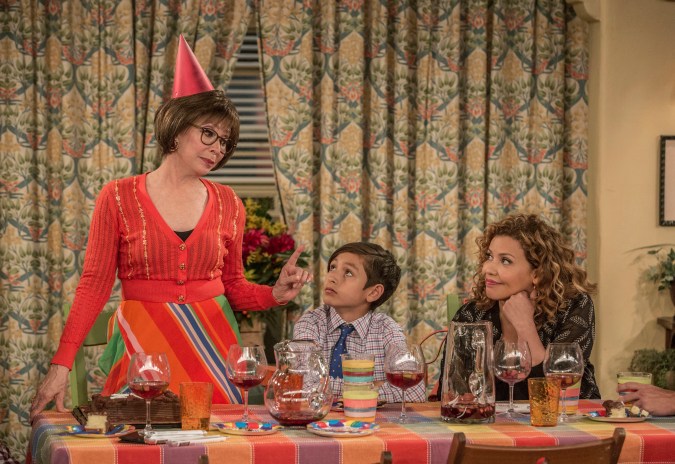
What it’s like to work in the ‘One Day at a Time’ writers’ room?
Calderon Kellett: Fortunately, we have such great writers. Mike and I shift through all of the ideas, and we sort of gauge it as a gut thing. So many great ideas are thrown out, so we sift through what’s best for the story we’re telling and the characters we’re telling them about. Just try to stay as organic as possible.
Badillo: It depends when in the season we’re talking about. Before we start shooting, we’re all around the table and Mike [Royce] and Gloria will come in and ask for pitches. Then we’ll pitch ideas on what we think should happen this season and what we feel like would be natural for these characters to go through. Then we get to a point where we finish writing the episodes, so we edit the episodes and punch up the jokes into a watchable 30 minutes.
Wolfe: We get there around 10 a.m. and start talking about our lives. We’re not only co-workers, we’re also all friends. We hang out with each other outside of work as well. We’ve become like a family. Then that leads into discussion, that then leads into stories. Mike Royce came from Everybody Loves Raymond, where all the stories came out the writers’ lives.”
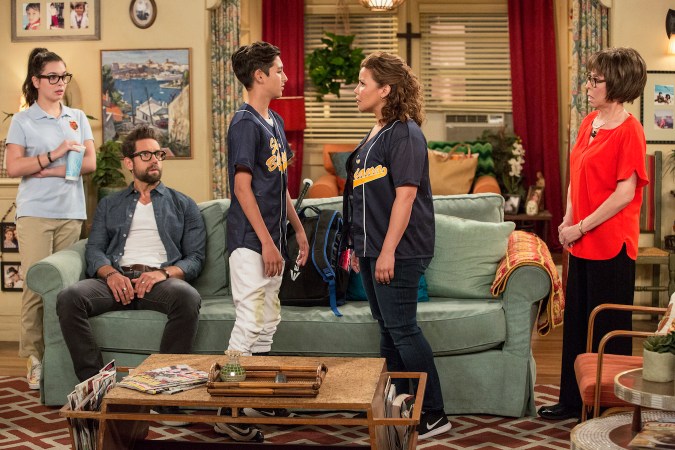
Hernandez: We get there, see what’s next, see what’s available. Did anyone bring any donuts? Anything good? If not, we go in with whatever’s available. The beginning stages of a show is a lot of talk about what do we want this season to be about what, what do we want the characters to do, what are some of the topics that are interesting to us, what are some anecdotes from our lives that we think may translate into a really strong episode with these characters? Once you get into production, a typical day would be a lot more focused on re-writing episodes, making jokes funnier or fixing problems you might see in rehearsal. It goes from this abstract idea to something very technical.
There’s a lot of my [Salvadorian] mom in the first season. Lydia reminds me so much of my mother.
Where can we see one of your jokes or episodes in Season 1?
Badillo: When you write something, it’s so precious. Now, it’s hard to remember what’s yours and what wasn’t. There’s this one line in the 5th episode where Penelope makes a reference on how they bring in all strays, and Lydia says ‘of course, except for cats because they will sit on your chest and steal your breath.’ It’s something my grandmother’s always said about cats.
Wolfe: There’s a lot of my [Salvadorian] mom in the first season. Lydia reminds me so much of my mother. There’s a part where she says ‘no hanky panky,’ which is something my mom says.
Hernandez: The thing I’m proudest of in the first season is the episode we wrote about the VA hospital. That was one where I had an out-of-the-box pitch, which was ‘what if we did this in real time, and she’s [Penelope] on hold the entire time?’ Mike and Glorida were super supportive of that. I’m really proud of how that episode ended up, because it really was something that I had conceptualized working out in a certain way and it worked out that way.
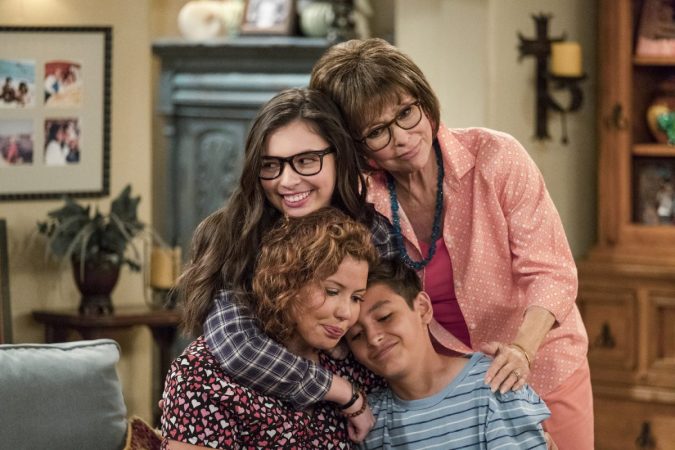
What’s something you’re looking forward to showing audiences in Season 2?
Calderon Kellett: I never got the chance to do an episode about Violeta [baby perfume], and now I did. My kids come home from my parents’ house smelling like Violeta. I don’t know what my mom does while they’re there, but they come out smelling like my childhood. I’m also really proud of the mental health stuff we did with Penelope. I think it’s very topical to talk about mental health in Latino culture. Cubans have trust issues, because the government and land that they loved screwed them. There is this feeling of no trusting authority that resonated with many Cubans I knew.
Badillo: My writing partner and I are the youngest people on staff, so we were most helpful with the kids and explaining what Snapchat is. The episode we did this year is a very Penelope-heavy episode, and it was a very interesting shift for us now that we’re getting a little older. I had to do a lot of work to think about my childhood through my mother’s eyes. When you’re 25, you don’t think ‘I’m going to be amazing writing for a 40-year-old mother of two.’ This was the first time I got to be a sort of mouthpiece for my mother.
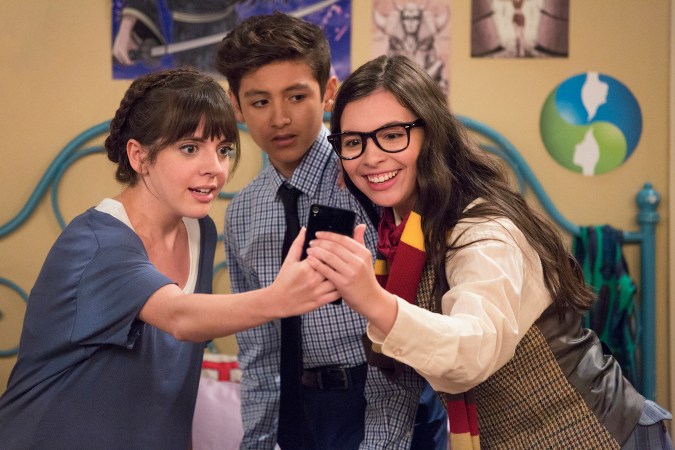
Wolfe: Lydia (Rita Moreno) has a relationship with Berkowitz (Stephen Tobolowsky), but she says it’s just a friendship. So, we have an episode where there’s a bit of jealousy. He starts seeing someone, and she starts to spy on him. It’s a thing very much from my family. If my mother suspects something is going on, she will find out. There are no better spies than Latina women. We are so good at it.
Hernandez: There is some pretty geeky stuff in the episode that I wrote that anyone at One Day at a Time would lovingly tell you was inserted by a true nerd. I think people are really going to enjoy that once they see it.
How did you approach writing about a Latino family living in this political climate?
Calderon Kellett: We wanted to talk about different things. We don’t consider ourselves a politics show. We try to be truly about what was going on with this family. But there’s been a change since we premiered after the election. I could feel a shift, and other Latinos in the room were feeling it as well. Emboldened racism is just taking over.
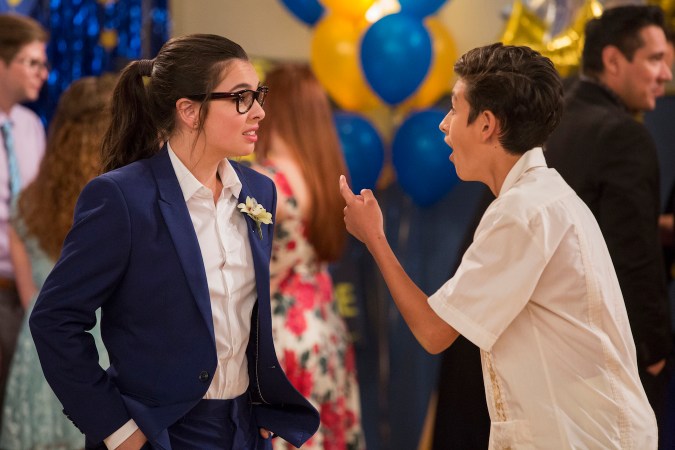
Badillo: Since we’re writing a show with current day people, there was no way to get around it. It would be a part of their lives. We just had to say that everybody has their take, and we had to ground it in what would these people in Echo Park in their financial background, what would their take be?
Wolfe: We don’t shy away from it. We bring it up. We have to be careful because our season is released like a year later, so we can be current but not too current. We’re trying to keep our world really realistic. If people have never really met a Latino before, they believe what the president says and how media stereotypes us. We show Latinos in a positive light, and I’m really proud I get to be a part of that.
Hernandez: We had several conversations about how to address the Trump presidency. What we ultimately decided on was to focus on the byproduct on real people rather than the specifics of the administration. In one episode, one of the characters deals with an environment that has become more openly hostile to people of color. We don’t look at it as what will happen to the USA. What about a teenager growing up who now – maybe for the first time in their life – is facing open racism? We wanted to see that through the viewpoint of our characters and our family.




